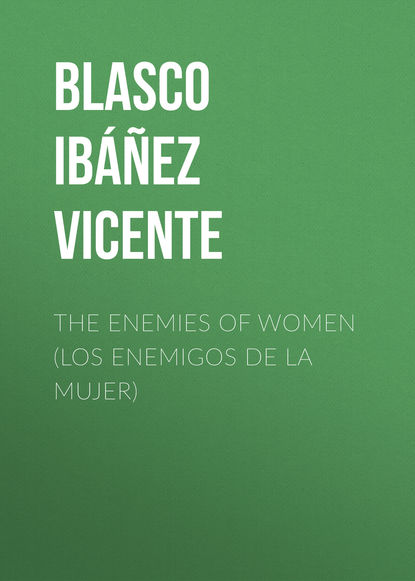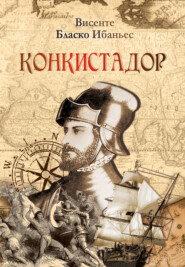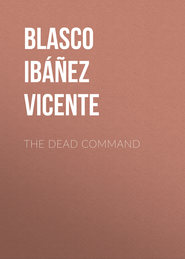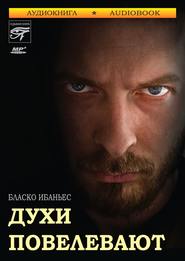По всем вопросам обращайтесь на: info@litportal.ru
(©) 2003-2024.
✖
The Enemies of Women (Los enemigos de la mujer)
Настройки чтения
Размер шрифта
Высота строк
Поля
At certain moments, the Colonel felt doubtful on listening to the way in which his rival formulated amazing heresies, revealing absolute ignorance of the great authorities who have codified the laws of encounters between gentlemen. And this man had been present at more than a hundred duels! Later, Don Marcos was amazed at the promptness with which the texts he had cited himself were appropriated by the young man; at the ease with which his classics had been assimilated, somewhat inverted in meaning, to be sure, the better to sustain affirmations contrary to his own.
When the encounter was arranged for in its slightest details, the Captain summed up his impressions with a simplicity that made the blood of Don Marcos run cold.
"One or both perhaps will be wounded. There is nothing extraordinary about that. Who isn't wounded these days? Surgery has made great progress; it is quite different from what it was at the beginning of the war. If a man doesn't die on the spot, he is nearly always saved. Besides, they will put them to bed and they won't remain abandoned on the field for days and days, as happens in war."
But the placid expression with which he talked about wounds was clouded over, giving way to a grim look.
"I am assuming, of course," he continued, "that no one is killed. Because if, for example, my comrade, Martinez, who is as gentle as a lamb and of whom I am very fond, should die in this farce, I'll kill your Prince on the spot, without any rules whatsoever, the way we kill a Boche at the front."
The tone in which he said these words was so sincere, that the Colonel, deeply impressed by them, did not observe how strange they sounded in the mouth of an expert in the laws of honor.
The conversation became more intimate and cordial as always happens when a difficult matter has been settled. Toledo was obliged to tell them about his life as a soldier – at least the way he imagined it had been, after so many years – and both young men, who had witnessed the combats of millions of men, showed the same interest as children listening to a strange tale, as he related obscure encounters in the mountains, battles that did not even have a name and were remembered only in an exaggerated fashion by Don Marcos himself.
The Parisian Captain, elegant and charming, also talked about his past.
"As for me, before the war, I worked in the Box Office of the theaters on the Boulevard. I haven't any other position."
Don Marcos had to make an effort to conceal his surprise. Indeed, he had seen more than a hundred duels; but in plays on the stage, between actors, who draw out the preliminaries of the encounters with ceremonious deliberation, in order to prolong the suspense of the audience. He should have guessed it on hearing his nonsense! What a fool that boy had made of him!
But immediately his eyes fell on the coats of the two young men. The same as Martinez: The Legion of Honor, the Military Medal and the War Cross, with stars. That of the former ticket seller was even crossed by a golden palm.
Ah, indeed! The world had changed. Where were the days of Don Marcos? Then he thought of all he had done in his life to increase his own self esteem; by appearing in full ceremony at various duels where most often no blood was shed. He also thought of what these young men had done and seen in less than four years. Their obscure origin brought to his memory the various warriors of Napoleon, whose names were celebrated and whose origin had been even worse. Some of them had succeeded in becoming kings, while these poor Captains once the war was over, would have to return, laden with glory, to their former occupations, struggling day by day to earn their bread!
They separated, agreeing to meet after dinner, to sign the paper stating the conditions of the encounter. They were all four in accord, but on mentioning this number, Toledo noticed that there were only three. Lewis had witnessed the long preliminaries with a certain impatience, seated on a divan in the ante-room of the Casino.
"There's a friend waiting for me. I'll be back in a moment."
And he had entered the gambling rooms, which were forbidden to the officers.
The Colonel had no illusions as to the duration of that moment, about two hours having passed. After leaving the Captains, he found Lewis at a trente et quarante table, with a heap of thousand franc chips in front of him. Of course he did not understand what Toledo whispered in his ear. He had to make an effort to recall.
"Oh, yes, the matter of the duel! I have every confidence in you; do whatever you please, I shall sign what you give me, but I am not going to get up, even though they might tell me Lubimoff was dead. What a day this has been, my friends! If they were all like this!"
And he turned his back, to make the most of his time, before the flight of luck would change.
Don Marcos had dined in the Café de Paris, going over in his mind the various articles he should put in the dueling agreement. The consideration that they were all relying on his superior knowledge caused him to be very exacting with himself. He wanted something concise and brilliant which would inspire respect in those boys, who were covered with glory. And he spent more than an hour, with the dessert dishes in front of him on the table, scribbling over sheet after sheet of paper, tearing each one up and beginning all over again on another. It was futile work: both signed in the reading room of the Casino, hardly giving the eloquent text a glance. As for Lewis he was obliged to get him out of the private gambling rooms by every sort of trick, and entreaty. The Englishman had forgotten to dine, in order not to offend Madame Fortune by his absence, and that stubborn Colonel came and disturbed him with his damned affair of the duel!
He signed the document without looking at it; he gave his word to the officers that he would come and get them in an automobile to take them to his castle. Then he ran away immediately, not without first saying to Don Marcos in a gruff tone:
"Until four o'clock, no later! If it isn't all over at four, I'll let them kill each other alone and come back here. That's the hour that the fine deals commence. To-day's luck is going to continue."
And he fled, smiling with pity on people who were occupied with less important things.
On finding himself alone, the Colonel began to make preparations for the encounter. He needed a doctor. He would go next morning and find an old physician in Monte Carlo who visited the Prince from time to time. He needed powder and balls; he proposed to go in quest of them to-morrow also. He needed two cases of pistols, and he had only one!
The matter of the two cases he considered essential. The other man's seconds did not know where to get theirs. No matter; he would find them one. The indispensable thing was that there should be two, so that fate might decide which they should use. Without that, the conditions would not be equal. And he spent the time until about one o'clock in the morning, asking hotel employees, rousing people out of bed, going down to the rooms of the Sporting Club, until an American whom he knew gave him a note for a certain fellow-countryman, a gloomy, half crazy fellow, who lived in an isolated villa on Cap-Ferrat. He thought he would conclude this negotiation the following day; and to do so he had rented an automobile.
Owing to the lack of vehicles and gas, the cost of the car was enormous; but it was necessary owing to the importance of his functions.
But now he was in Villa Sirena, at two o'clock in the morning, slowly cleaning the pistols, as though they were fragile jewels.
In the silence of his bedroom, far from mankind, influenced by the lonely mystery of the small hours of the night, which puts a certain vagueness in things and ideas, he felt an enormous self-aggrandizement. No; his world had not changed as much as he thought. The proof was that he was there, cleaning weapons for a duel!
On waking up the next morning, the Prince could not find his "chamberlain". The rented auto had carried him off at seven o'clock, to complete his preparations.
Lubimoff wandered about the gardens, stopping in front of the cages, which sheltered various exotic birds. Then with an absent-minded look, he followed the evolutions of various peacocks, spreading their tails, colored blue and golden, or a royal black, in the sunlight.
His old valet interrupted his promenade. Some men had come with a truck to get Señor Castro's baggage.
Michael showed no surprise; they might hand over everything to them that belonged to Don Atilio. But the servant added that the same men also wanted to take away the little that belonged to Señor Spadoni, news which amazed the Prince. He, too! What reason had Spadoni to desert him?
He glanced at the brief note written to the Colonel and signed by them both. In his flight, Castro was taking with him the dreamy pianist.
"All right," he thought; "let them all leave; let them leave me alone. If they think that by doing so they are going to make me refrain from carrying out my intention!.."
Then he resumed his walk.
Only a few hours remained before he would find himself facing that young man whom he so hated. He was going coldly to do away with him, so that he would not continue to be a nuisance. The conditions planned by the Colonel were sufficient for a marksman of his skill to bring down his adversary. He needed only a single shot.
For a moment he thought of going to the end of the gardens, where he sometimes passed the time shooting. It was a good idea that he should practise steadiness of hand – the pistol is full of surprises. Then he decided not to, as it seemed unworthy that he should add these preparations to his evident superiority. His mediocre adversary could not be practising at that time. He had no facilities for doing so in Monte Carlo where he had no other friends than his convalescent comrades and a few ladies. He, on the other hand!.. he held out his muscular arm, keeping it rigid for a few seconds with his eye glued on his fist. There was not the slightest tremor! He would be able to place a ball wherever he wanted. Poor Martinez might consider himself a dead man. And not the slightest sign of remorse disturbed the Prince's infernal pride in his implacable strength.
His consciousness of superiority was so great and his certainty in the result so absolute, that he finally began to feel some doubt, that feeling of uneasiness which is inspired by the mystery of things still to be accomplished. Suddenly there came crowding into his memory stories of combats in which the weak unexpectedly triumphed over the strong, through an obscure mandate of inherent justice. He recalled many novels in which the reader draws a sigh of relief on seeing that the hero, modest and agreeable, placed in danger of death by the "villain," who is stronger and wickeder than he, not only saves his own life, but in addition kills his adversary, through some happy chance; all of which goes to show the existence of some superior and just power which on most occasions seems asleep, but at certain moments awakens, giving each person what he deserves. Since the time of David, the little barefoot shepherd, killing with a stone the huge giant clad in bronze, humanity has enjoyed such stories.
Pistols are capricious weapons, and lend themselves to the absurd determinations of fate. Might he not fall, with all his skill, at the poor Lieutenant's first shot?
He held out his arm again, as before, looking at his clenched first. Then he smiled, with the smile of his ancestors, which gave his features a Mongolian ugliness. Mere traditional fiction, inventions of story writers, to flatter the public in a sentimental love of equality! The strong are always the strong. Within a few hours he would sweep that nuisance out of the way, calmly and without remorse, the way superior men always act.
A roaring sound coming from the railway line drew him from his thoughts. It was a trainload of soldiers approaching, like all the others, with an ovation of shouts, acclamations and whistling. It was rolling along towards Italy, in the direction opposite to that of the numerous trains coming to the French front. The Prince walked over to a garden terrace, the stone flower-covered wall of which descended to the track. The cars seemed to pass of their own will before his eyes, showing him one side as they rounded the curve, and then the other as they reached another curve, where they were lost to view.
The uniform of these combatants puzzled the Prince for a moment, as an unexpected novelty. They were dressed in dark blue serge, with their blouses open at the neck, and sleeves rolled up. On their heads they wore white caps with the brims turned up all around, like the little paper boats that children make.
He finally recognized them: they were sailors from the United States, a battalion, sailors from the fleet, going to Italy so that the Stars and Stripes might represent the huge republic on the icy summits of the Alps and on the hot marshy plains of Venetia.
With the rapidity of mental visions, which reveal, one superimposed upon the other but nevertheless distinct, a great number of diverse images, the Prince recalled the harbors of North America which he had visited in his youth, aquatic beehives, gathering together all the work and riches of the earth; monstrous, interminable cities, with populations as large as nations, and in which liberty and well-being seemed to have reached their highest limits… And these men were leaving the comforts of a scientifically organized existence, their productive business, their amply remunerative work, their immediate hopes of wealth, perhaps to die for an ideal in the Old World, merely for an ideal, since they were not seeking new strips of land nor indemnities for their country! And until then, the average person had considered this country as the most materialistic, the least poetic and idealist of all nations, calling it the land of the dollar!.. It was true that unselfish ideals were something more than words, since millions of men were coming across the sea to give their blood for them!
The sailors, after passing through the city of Monte Carlo, where they were greeted with cheers and waving flags, were entering the open country, where their shouts faded away with no answering echoes. For this reason their attention was attracted by that flowering terrace and the man appearing above it. It was like a procession on review: the carriages, one by one, came to life as they passed the Prince. From all the car windows arms with sleeves rolled up projected, shaking white caps. On the car roofs, a few strapping lads were gesticulating, with arms and legs extended, while the wind rippled in the folds of their dark trousers, above the white leggings. More than a thousand throats greeted the solitary man on the terrace with gay whistling, hurrahs, or unintelligible cries, which gave vent to the exuberant feelings of those youths, hungry for danger and glory, full of joy and curiosity, as they passed through an Old World which to them was new.
Lubimoff remained motionless, with his elbows on the railing, and his chin in one hand, as though he did not see that pent-up river of men, gliding along below his feet. The gay sailors, as they passed, turned their heads, repeating their shouts and greetings, as though anxious to awaken that human figure, rigid and clinging to the balustrade as though forming a part of its decoration.
He had completely forgotten the thoughts and worries of a moment before. All he saw was that torrent of young men rushing to meet danger and death for certain ideals as simple and beautiful as their blossoming youth. They were coming from the other side of the earth with that naïve faith that accomplishes the great miracles of history; and in the meantime, Prince Lubimoff, who, by dint of seeking after superior ideas and exquisite sensations, had finally come to believe in nothing, was there at his garden rail, calculating the surest means of killing a man, a man who was useful, like those who were passing.
Castro's image arose in his mind. He, too, had witnessed two days before, the passing of a train. He recalled the impression so deep and powerful that had impelled him to leave Villa Sirena, and break with his relative. He could see, just as it had been described to him, the bitter look of that red-headed soldier insulting him with scorn.
"There's room here for one more!"
The American sailors continued their whistling, and their exuberantly youthful shouting; but it seemed to him that these voices and waving of hands said the same as the other man's words, inviting him with ironical politeness: "Come; there's a place here for you!" A little later, and the voices were dumb, but he could still hear them, deep in his soul, like the far-off booming of a bell. He had considered himself a brave man, who as a matter of distinction, of sophistication, of refined indifference, preferred to keep aloof from things which rouse enthusiasm in other mortals. But the far-off tolling of the bell protested, ringing in his ear, repeating a single word: "Coward! Coward!"
He walked about the garden in a pensive mood until Toledo arrived in the afternoon. They had lunch in a hurry, and the Colonel made several recommendations. His knowledge of dueling matters, which has as many branches as the tree of science, touched in one of its ramifications on cooking. The Prince should not take any wine; since he must keep his hand steady. And as the Colonel said this he was praying inside that the bullets would all go astray, since both contestants inspired an equal interest in him. Some soft boiled eggs, nothing more; and not much liquid. At the last moment he should remember to empty his bladder. A terrible thing a wound with internal leakage! Nothing escaped the Colonel – he thought of everything.















